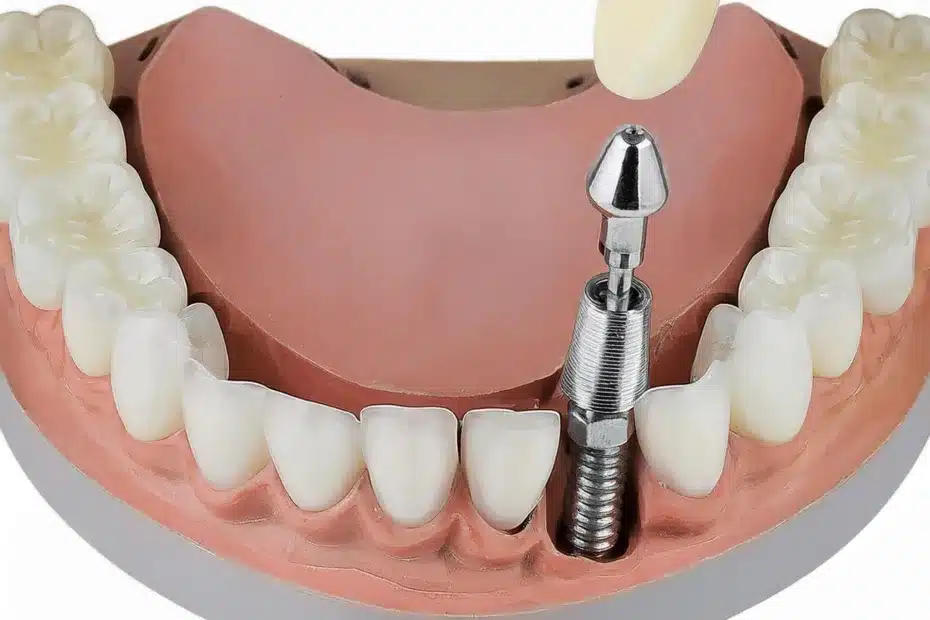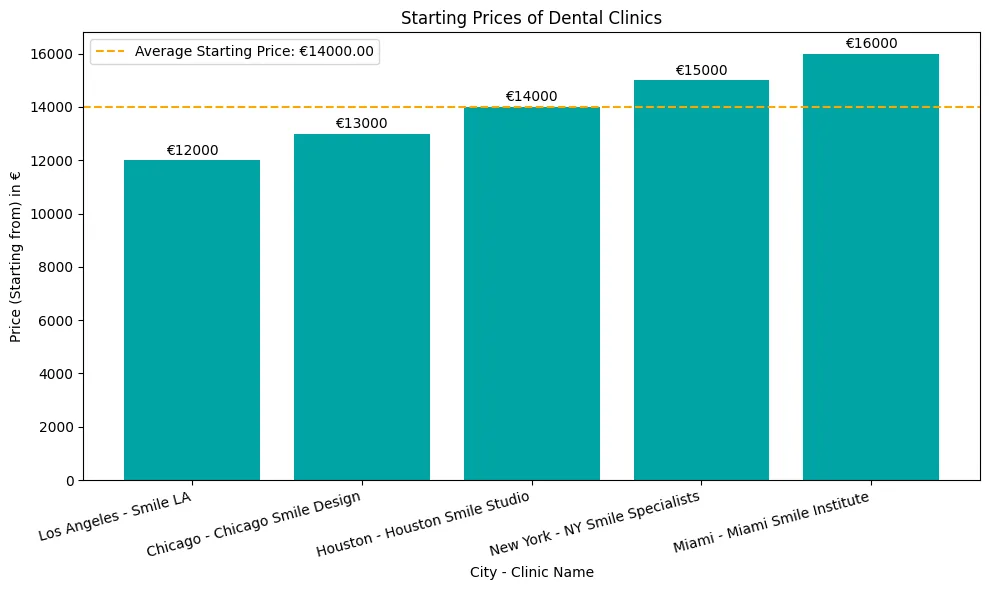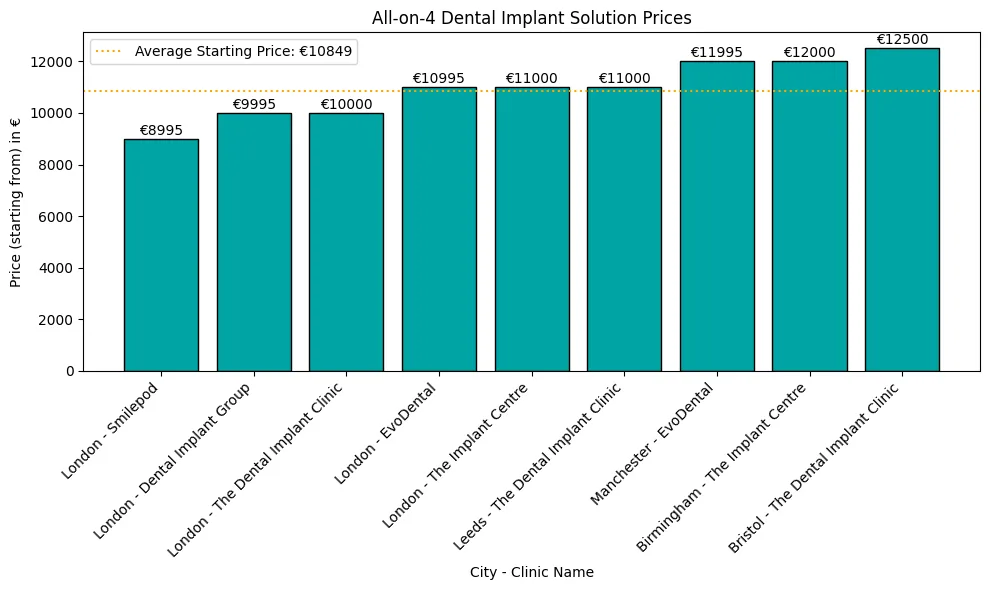Implantet dentare janë të forta dhe të qëndrueshme, duke u lejuar individëve të marrin pjesë në mënyrë të sigurt në shumicën e sporteve me rrezik minimal.
Megjithatë, është thelbësore të përdorni pajisje mbrojtëse, të tilla si mbrojtëset e gojës, për të parandaluar çdo dëmtim të mundshëm të implanteve gjatë aktiviteteve me ndikim të lartë.
A mund të luaj sport me implante dentare?
Po, ju mund të luani sport me implante dentare. Shumë atletë që i janë nënshtruar procedurave të implantit dentar ndajnë përvoja pozitive të mbajtjes së një stili jetese aktive duke u kujdesur për shëndetin e tyre dentar. Megjithatë, ju duhet të merrni masa paraprake për të mbrojtur implantet tuaja nga dëmtimi.
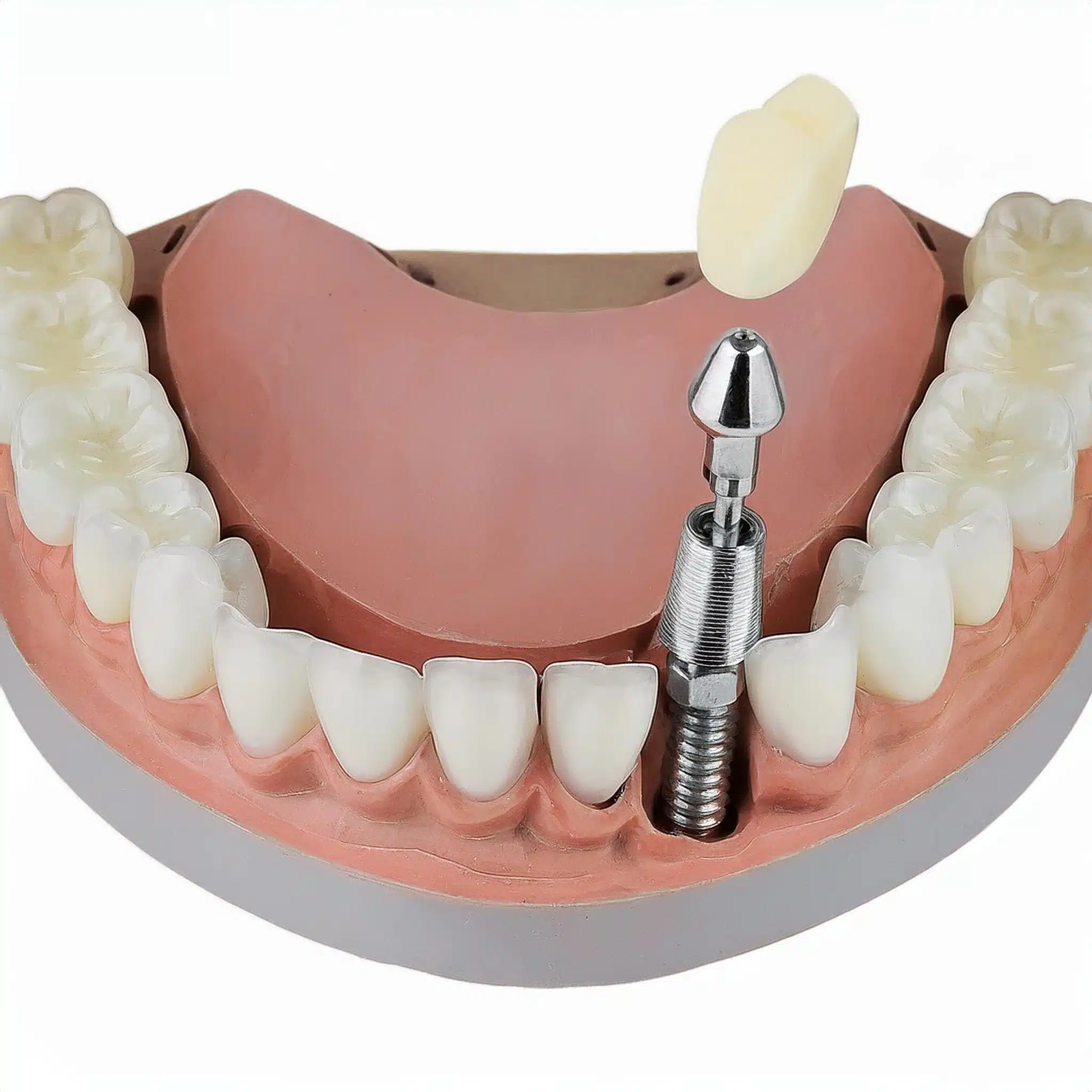
Si t'i mbroj implantet e mia dentare kur bëj sport?
Vishni një mbrojtës goje
Një mbrojtës i personalizuar i gojës mund të sigurojë mbrojtje të mirë për implantet tuaja dentare duke thithur dhe shpërndarë ndikimin e çdo goditjeje në fytyrë.(1)
Për më tepër, implantet dentare ofrojnë mbrojtje të shtuar kundër lëndimeve gjatë aktiviteteve sportive, duke përmirësuar ndjeshëm performancën dhe sigurinë e atletëve.
Aktivitete me ndikim të ulët
Zgjidhni sporte që kanë ndikim të ulët në fytyrën tuaj, të tilla si noti, çiklizmi ose joga.
Këto sporte zvogëlojnë rrezikun e dëmtimit të implanteve tuaja dentare.
Të apasionuarit pas sporteve rekreative shpesh zgjedhin këto aktivitete me ndikim të ulët për të ruajtur stilin e tyre aktiv të jetës, ndërkohë që sigurojnë që implantet e tyre dentare të mbeten të mbrojtura.(3)
Kontrolle të rregullta
Programoni kontrolle të rregullta për të monitoruar implantet tuaja dhe për të adresuar çdo problem herët.
Dentisti juaj mund t'ju japë këshilla personale bazuar në sportin tuaj.
Për më tepër, pas pjesëmarrjes në aktivitete sportive, është thelbësore t'i nënshtrohet një vlerësimi të plotë pas lëndimit për të identifikuar çdo traumë të brendshme dhe për të adresuar menjëherë komplikimet e mundshme.
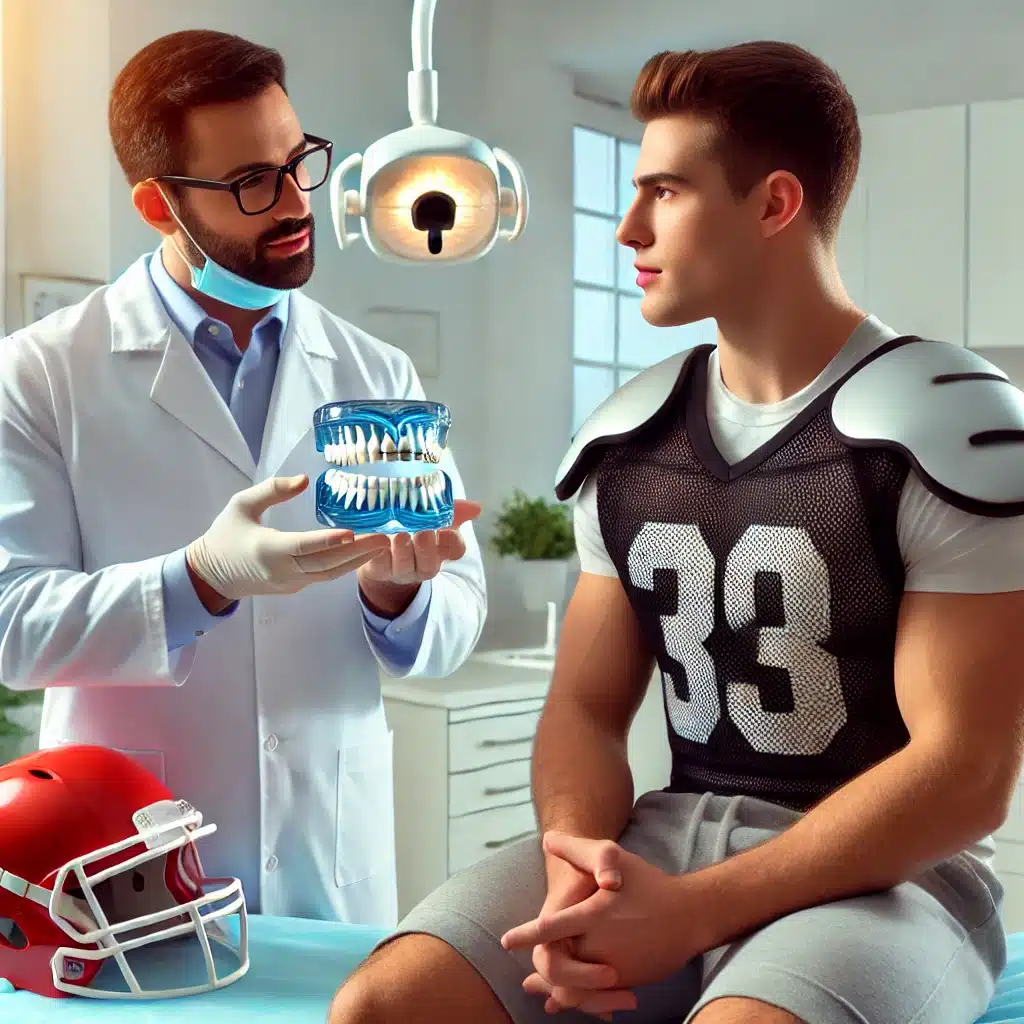
Çfarë rreziqesh paraqesin sportet për implantet dentare?
Rreziqet që paraqesin sportet për implantet dentare
Ndërsa rrallë, disa pacientë mund të përjetojnë implantet dentare dhe alergjitë reagimet ndaj materialeve të implantit, të cilat mund të përkeqësohen nga aktiviteti fizik dhe djersitja.
Lëndimet nga ndikimi:
Sportet me ndikim të lartë mund të shkaktojnë traumë në gojë, duke dëmtuar ose zhvendosur potencialisht implantet dentare.(5)
Thyerje dhe thyerje:
Goditjet e drejtpërdrejta në fytyrë ose nofulla mund të çojnë në fraktura ose thyerje të implantit ose kockës përreth.
Dëmtimi i indeve të buta:
Kontakti i ashpër mund të shkaktojë lëndime të mishrave të dhëmbëve dhe indeve të buta përreth, duke ndikuar në stabilitetin e implanteve.
Rreziku i infeksionit:
Lëndimet ose plagët e hapura në gojë nga aktivitetet sportive mund të rrisin rrezikun e infeksionit rreth vendit të implantit.
Kush mund të vendosë implante dentare? Në përgjithësi, kushdo me shëndet të përgjithshëm të mirë dhe densitet të mjaftueshëm kockor mund të jetë kandidat për implante dentare.(4)
Megjithatë, disa kushte shëndetësore dhe medikamente mund të ndikojnë në suksesin e procedurës.
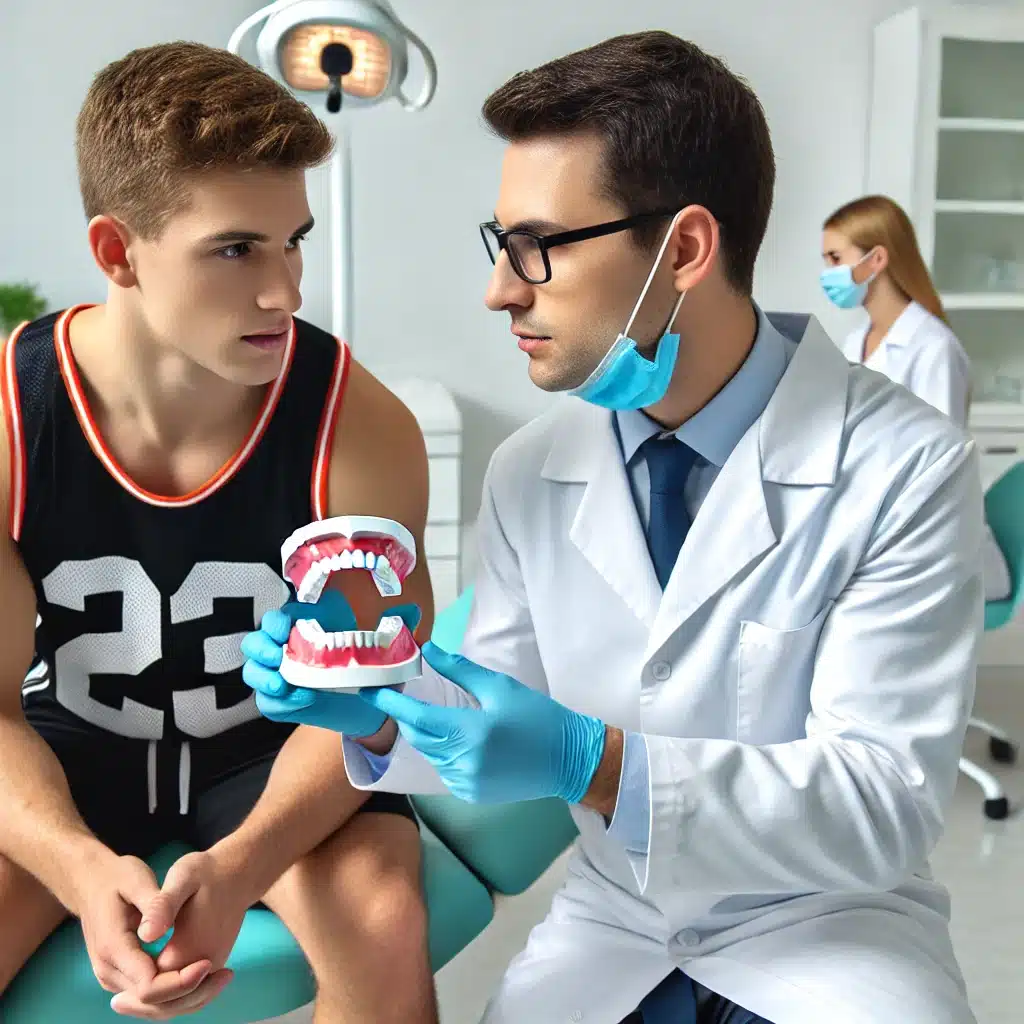
Cilat sporte duhet të shmang me implantet dentare?
Ndërsa shumica e sporteve mund të luhen me implante dentare, ka disa sporte me ndikim të lartë dhe me kontakt që paraqesin një rrezik më të lartë për të dëmtuar implantet tuaja.

Sporte me ndikim të lartë
Boks: Goditjet e drejtpërdrejta në fytyrë mund të dëmtojnë ose zhvendosin implantet dentare.
Artet marciale: Kontakti fizik mund të dëmtojë implantet dentare.
Ragbi: është një sport me kontakt të lartë me një rrezik të lartë të lëndimeve të fytyrës.(6)
Mundje: është një sport fizik me ndikim në zonën e gojës.
Kontaktoni Sportin
Futboll: Kontakti dhe trajtimet mund të shkaktojnë lëndime në fytyrë dhe dëmtime të implanteve dentare.
Hokej: Si hokej mbi akull ashtu edhe hokej në fushë përfshijnë kontakt fizik dhe ndikime në fytyrë.
Basketboll: Bërrylat dhe përplasjet gjatë lojës mund të dëmtojnë implantet dentare.
| Sporti | Niveli i rrezikut |
|---|---|
| Boks | Lartë |
| Artet marciale | Lartë |
| Ragbi | Lartë |
| Mundje | Lartë |
| Futbolli | Lartë |
| Hokej | Lartë |
| Basketboll | Lartë |
Përfundime dhe çështje kyçe
Marrëdhëniet kryesore:
Përdorni pajisje mbrojtëse: Mbajtja e një mbrojtëse goje të personalizuar është thelbësore për mbrojtjen e implanteve dentare gjatë sporteve me ndikim të lartë. Ndihmon në shpërndarjen e forcave nga çdo goditje në fytyrë, duke minimizuar rrezikun e dëmtimit.
Zgjidhni sporte me ndikim të ulët: Angazhimi në sporte me ndikim të ulët si noti, çiklizmi ose joga mund të zvogëlojë ndjeshëm rrezikun e dëmtimit të implanteve dentare.
Kontrolle të rregullta dentare: Kontrollet e shpeshta mundësojnë zbulimin e hershëm të problemeve të mundshme dhe sigurojnë që implantet të mbeten në gjendje të mirë.(3)
Ndërgjegjësimi për rreziqet: Kuptimi i rreziqeve specifike që lidhen me sporte të ndryshme mund të ndihmojë në marrjen e vendimeve të informuara se cilat aktivitete duhet të ndiqen dhe çfarë masash paraprake duhet të merren.
konkluzioni:
Pjesëmarrja në sporte me implante dentare është e realizueshme dhe shumë atletë vazhdojnë të gëzojnë një mënyrë jetese aktive pa kompromis. Megjithatë, ruajtja e integritetit dhe jetëgjatësisë së implanteve dentare gjatë aktiviteteve sportive kërkon respektimin e masave specifike mbrojtëse dhe kujdesin e rregullt dentar.
FAQ
Referencat
(1) Albrektsson T, Berglundh T. Rishikimi sistematik i implanteve dentare. J Paradontol. 2017; 88: 443–464.
Neni: Rishikimi sistematik i implanteve dentare
(2) Aghaloo TL, Moy PK. Konceptet aktuale në implantet dentare. J Dent Res. 2017; 96: 275-282.
Neni: Konceptet aktuale në implantet dentare
(3) Zix J, Schmidlin PR, Hämmerle CHF, et al. Një rishikim sistematik i implanteve dentare dhe materialeve të tyre. Clin Oral Implants Res. 2020; 31:100–114.
Neni: Një rishikim sistematik i implanteve dentare dhe materialeve të tyre
(4) Jansen JA, Tenenbaum HC, Horwitz J. Roli i materialit implant në suksesin e implanteve dentare: Një përmbledhje gjithëpërfshirëse. J Implantol oral. 2020; 46:12–23.
Neni: Roli i materialit implantues në suksesin e implantit dentar
Pjetursson BE, Tan WC, Thoma DS, etj. Një rishikim sistematik i suksesit të implanteve të zirkonisë. J Dent. 2019; 85: 1-10.
Neni: Një rishikim sistematik i suksesit të implanteve të zirkonisë
(6) Lu X, Zhao L dhe Yang X. Implantet qeramike në praktikën dentare: Një përmbledhje. J Clin Periodontol. 2021; 48: 667-681.
Neni: Implantet qeramike në praktikën dentare

